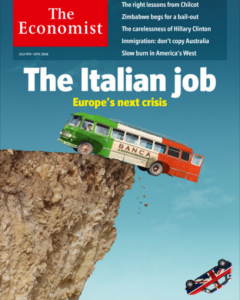In recent days it had been the Financial Times to ask the EU Commission to “not be intransigent ” to the Italian Government asking Brussels can recapitalize with public money , in case of extreme necessity, the bank weaker. And to point out that “after the Brexit , the score line of Europe through Rome.” Thursday, the day when the Capitol was held the first municipal council of the era ray , the appeal has joined the ‘ The Economist . That on the cover of this week’s issue, entitled The Italian Job – Europe next crisis service, the specter of a “ crisis can infect the Eurozone” adds coté purely political: the fear that without the green light from Brussels and Berlin to the injection of public funds in institutions, any bank failures do fall to the peak of quotations premier Matteo Renzi , lead to a no win at referendum of October and pave the way for an executive weblog M5S . Scenario according to the newspapers considered bibles of capitalism threatens the ‘ very existence of the euro . An argument in line with the content of the infamous report Jp Morgan against the “socialist Constitutions” and “ weak executive ” in the countries of southern Europe, which advocated changes similar to those contained in the bill Woods to foster “greater European integration area.”
the number one Eurogroup against the exemption – the capture of the British weekly position came just as from the President of the Eurogroup Jeroen Dijsselbloem seemed to close the door to a Notwithstanding to legislation on bail in (according to which to take on the save of institutions in difficulty must be first of shareholders, subordinated bondholders and depositors with more than 100 thousand euro on the account, ed ) to allow Italy to rescue the banks most at risk – from Monte dei Paschi di Siena – using public money. As is permitted “in via precaution ” in Article 32 of the EU Directive on restructuring and resolution of institutions ( Brrd ). Dijsselbloem said that “investors and shareholders of the banks will have to solve problems, not to deviate from the rules so that the taxpayers
Even the ECB deployed in favor of public support – An entirely different view l ‘ the Economist : “Forcing the common Italian to bear again heavily damage losses premier Matteo Renzi , blurring his hopes of winning the referendum on constitutional reforms in the autumn, “says the weekly. That “if the rules on bail-in will be applied with stiffness in Italy protests savers will undermine the trusted , and open the doors of the Power to Five Star Movement , which attaches to the single currency Italy’s economic problems “. That’s why, the reasoning goes, “if handled badly, l ‘” Italian job “(literally” The Italian Job “ ed ) could mark the ruin Eurozone “. The conclusion is obliged: “The right answer is allow the Italian government to finance the defense mechanisms of its vulnerable banks with sufficient public capital to allay fears of a systemic crisis “it would be” dangerous “for the entire euro area. A thesis shared also by leaders of the ECB : Vice President Vitor Constancio has reiterated that “the current situation, with declines in new shares after Brexit, deserves a deep reflection on the opportunity to overcome certain market imperfections with a little ‘of public support to significantly improve the stability of certain banking sectors. “

the Economist” apply rules with stiffness will open the doors to M5S blaming the euro problem “ – According to the ‘ the Economist instead,” the Italian prime minister is right, “because” the pressures market on Italian banks will not decrease as long as the trust will not be restored, and this will not happen without public funding. If the rules of bail-in will be applied with stiffness in Italy, the protests will undermine the confidence of investors and open the doors of power to the Five Star Movement, which blames the single currency of Italy’s economic problems “. At that point “it would increase the belief that Italy is receiving little benefit from the alleged sharing of risks between the Eurozone countries, while it is damaged by the many constraints that must comply with.” And “if the Italians were to lose confidence in the euro, the single currency not survive .” “It makes no sense follow the rules to the letter if you do it marks the end of the single currency”, the reasoning goes.
“Appease the systemic crisis fears “ – So? Simple, “the right answer is to authorize the Italian Government to fund the defense mechanisms of its vulnerable banks with public capital that is sufficient to allay fears of a systemic crisis.” Authorize the use of the clause contained in Directive Brrd to allow “temporary capital injection from the state in Monte dei Paschi “, on Thursday lost another 5.8%, and now has a cap below 800 million Euros, could “be enough to prevent further collapse on the Stock Exchange of securities, so that the other Italian banks, like Unicredit , manage to raise private capital. ” Europe “would welcome this outcome as an example of Solidarity within the rules.” Although “will not return to the health institutions or solve any of the fundamental problems of the euro bloc.”
->
No comments:
Post a Comment